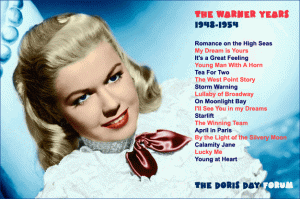
I was saddened to hear of the death of Doris Day today. She epitomised the dreams of post war America as it settled down to prosperity and super power status. Her screen persona was that of the clean living girl next door reflecting all of those all American values that underpinned the American dream .
Born Doris Mary Ann Kappelhoff in 1922 she was destined to be a dancer until a car accident broke both her legs and confined her to a wheel chair where she sat next to the radio, singing along to the big bands of the day. She particularly studied the voice of Ella Fitzgerald and I fancied that I could hear that influence, especially in slower numbers that allowed her to extend her phrasing. She subsequently broke into the big band scene, changing her name to Day when she made her debut with Barney Rap in 1939.

She described her time touring with the bands as her happiest and she rose to fame with six top ten hits in 1945/46. This included her signature song, Sentimental Journey which became the song associated with the returning troops. She commenced her film career in 1948 with the film Romance on the High Seas and this was the first of some forty films in a long career. We forget how big a star she really was mainly because she was type cast as the feminine star in romantic comedies which did not result in lifting an Oscar. However, in the early sixties she ranked number one at the box office four times, a record only equalled by eight people since. She acted opposite almost all of the biggest stars of the time including Clark Gable, Cary Grant, James Cagney, David Niven, Jack Lemmon, Frank Sinatra, Ronald Reagan, Richard Widmark, Kirk Douglas, Lauren Bacall and Rod Taylor. As with most Hollywood stars her private life did not reflect her screen roles and with four marriages, one of them being violent and finding that her third husband had spent her fortune she did not have an easy life.

In 1968 she started the last phase of her career by appearing in the Doris Day Show which lasted for five years. Initially, she was obliged to perform to fulfil a contract that her husband had made without telling her. She had also promised to repay the debts that her lawyer had caused by making bad investment decisions which was the subject of a law suit that was only finalised in 1979.
Doris Day stood for a number of things to those who remember the 50’s and 60’s. She played the clean living, all American girl next door and had a strong moral code which was illustrated by her turning down the role of Mrs Robinson in the Graduate on the basis that the script was vulgar and offensive. She had a very warm and distinctive voice which was enhanced by the recording techniques of the time that had the effect of bringing the listener into an intimate space with the singer. I always thought that her singing Move Over Darling was one of the sexiest songs that I had ever heard. I still have it on my Spotify list. She was the last to represented the Golden Age and had to face the loss of innocence of the late 60’s when her film career started to fade. What saw her through all her tribulations over the thirty five year she was in the public eye was her honesty, sense of duty, sense of humour, talent and sheer professionalism.
It is difficult to get a true sense of who Doris Day was. I think that she was a very private person and her later years would seem to bear this out. Looking through the photo’s on the net they all seem to be controlled and posed and the only one I saw of her where she seemed natural is the one taken of her on the set of Calamity Jane below. As we get older we filter our memory so that we tend to recall only the happier times and the sound of Doris Day singing brings me back to a steamy kitchen with Two Way Family Favourites on the radio. I have failed to do her justice in this essay and even to tell of the important moments in her life. Failed to record all of the tributes and honours she received; failed to record the reconciliation with her son who died before her in 2004. All I can say is that I miss her and thank her for all those memories.
Goodbye Doris and RIP

Refernce: Wikipedia. https://en.wikipedia.org/wiki/Doris_Day#Breakthrough_(1955–1958)
